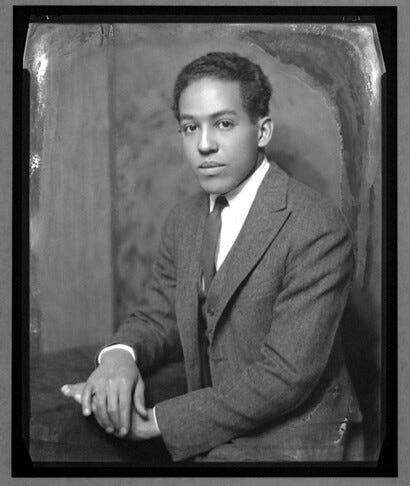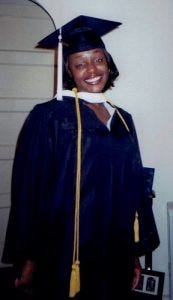Failed my English final, became a professional writer
Blog 3 of 8: School expulsion, failing grade ~ Why I chose the Harlem Renaissance for my Toastmasters speech

This post was originally published on January 30, 2019 on Chicago Now’s “Message from Montie” blog.
As a member and the (former) Vice President of Education of Unity Toastmasters (a community club in Toastmasters International), I chose one of eleven Pathways — “Presentations Mastery” — as a public speaking goal. This is the blog series of eight posts I wrote in one month to complete Level 4.*
An Upwork client asked me recently who was my biggest influencer. I didn’t miss a beat before I responded that Harriet Tubman and Langston Hughes will always be my two biggest influencers.

Anyone who knows me well remembers the 24 x 36 poster of Langston Hughes in the living room of my second apartment. As soon as you walked in, he greeted you from the door angle. If I could jushe any assignment in school, I’d include Harlem Renaissance writers.
Fighting for representation in the literary canon
But when I was pondering on a topic to discuss for the 2018 International Speaking Competition of Toastmasters, I wasn’t quite sure if others would want to hear why I love the Harlem Renaissance so much. The short story version is the Harlem Renaissance was the first topic I wrote about professionally and was published in a magazine (Citizens in America).
Recommended Read: “From PWI to HBCU: Why I fled ~ College, and threat of expulsion, made my naivete about racism disappear”
The longer version involved me being on academic probation (with a 3.2 GPA) — with the threat of expulsion — from my first undergraduate university, Northern Michigan University. While NMU had a questionable excuse for trying to expel me, the true reason was that I’d ruffled quite a few feathers in the English department. I also refused to back down from creating a diverse literary canon in an American Literature III course.
ADVERTISEMENT ~ Amazon
As an Amazon affiliate, I earn a percentage from purchases with my referral links. I know some consumers are choosing to boycott Amazon for its DEI removal. However, after thinking about this thoroughly, I want to continue promoting cool products from small businesses, women-owned businesses and (specifically) Black-owned businesses who still feature their items on Amazon. As of the first date of Black History Month 2025, each new post will ALWAYS include a MINIMUM of one product sold by a Black-owned business. (I have visited the seller’s official site to verify that Amazon Black-owned logo.) I am (slowly) doing this with older, popular posts too. If you still choose to boycott, I 100% respect that decision.

Choosing an edgier Toastmasters speech
Initially I took the safe route and made my competition speech (and my final speech to receive the Competent Communicator certificate) about innovation and ideas. I’d just finished an amazing book by Sam Harrison entitled “Idea Spotting: How to Find Your Next Great Idea.”
But by the time I finished my speech, and realized I would advance to the next round (area competition), I just wasn’t satisfied. This topic did not speak to me in the same way as Speech 7* entitled: “Harlem Renaissance: Why I’m Proud to Have Failed My English Final.”
I asked my area director could I give a different speech during the area competition, and she OK’d it. I gave that speech and advanced to the division round. And while I did not place in first, second or third place in that round, I still couldn’t have been happier.
Recommended Read: “Book Review: Langston Hughes recaps his writings as a Defender columnist”
Why I’m proud of my 2018 International Speaking Competition speech
In addition to telling the story of why I put my degree on the line to go up against an entire English department; almost got expelled from school; and received a big, red “F” on my final in an unmarked envelope (knocking one grade down from an A+ to a C+) , it was one of the proudest moments I’ve ever had in higher education. I should have framed the “F,” but instead I laughed at the unapologetic racism from that professor, Carol Bays.
What mattered most is I stayed true to myself at that school. I used that momentum to let three Toastmasters crowds know why it is important to stand your ground, even when it may not be popular. Sometimes it may lead to more success than you ever imagined.
I’d already been accepted into another university (Lincoln University) and knew I had absolutely no desire to ever step foot in Marquette, Michigan or on Northern Michigan University’s campus again. I gushed with pride stepping foot into Jefferson City, Missouri and seeing Langston Hughes Memorial Library.
The minute I stepped on my HBCU** campus, it felt like home. I was following in the footsteps of my father, who also graduated from an HBCU (Kentucky State University). I was following in the footsteps of my grandfather, a St. Louis native, who took courses at Lincoln University before being drafted into the army. And I was following in the footsteps of all of those writers I grew to love, who fought to have a right to speak and write what others (including higher education universities) tried to dismiss and discredit.
THE FIRST AND ONLY ENGLISH ESSAY I GOT AN “F” ON: "A matter of opinion versus skill," Citizens in America magazine, Vol. 1, No. 5, November/December 2004
Interestingly, taking courses at a private, Catholic grad school (DePaul University) pushed me to represent my influencers just as hard as LU. The conglomeration of lessons learned at LU and DePaul helped make me into the writer and public speaker that I am now.
I am excited about our upcoming local 2019 International Speaking Competition at Unity Toastmasters, which will be held on Sat., Feb. 23. I want to know what is on the minds of our members. Will they give motivational speeches like first-place winner Ramona J. Smith, heart-felt personal stories like Zifang “Sherrie” Su or thoughtful stories like Anita Fain Taylor?
Whatever story they choose to tell, I just hope it is a story they’ll be proud to share long after the competition completes.
* Speech 7 in the Competent Communicator manual focuses on “Researching Your Topic.”
** Historically Black Colleges and Universities
Did you enjoy this post? You’re also welcome to check out my Substack columns “Black Girl In a Doggone World,” “BlackTechLogy,” “Homegrown Tales,” “I Do See Color,” “One Black Woman’s Vote” and “Window Shopping” too. Subscribe to this newsletter for the weekly posts every Wednesday. Thanks for reading!






